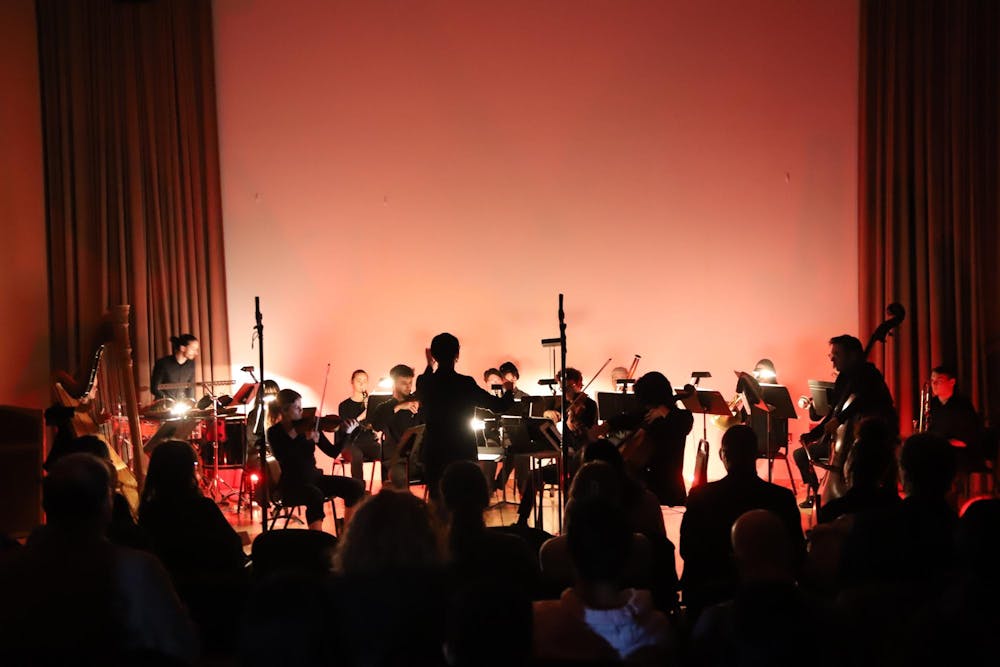About a year ago, Daixuan Ai, a doctoral composition student at the Jacobs School of Music, had just read about a racially motivated attack on an IU freshman in the New York Times. An 18-year-old Asian student was getting off a Bloomington transit bus Jan. 11, 2023, when Billie R. Davis, a 56-year-old Bloomington woman, rushed at her and stabbed her seven times in the head, leaving visible puncture marks. Davis told authorities she had stabbed the student because she was Asian.
The attack had happened a week before Ai read the New York Times article, but Ai hadn’t heard about it until then, a fact which enraged her almost as much as the attack. She had to write a song.
“I was almost angry how the word did not really spread at all within the community and that is pretty true to my experience as an Asian person in the country,” Ai said. “I feel like whatever happens to my community almost doesn’t really matter to the surrounding environment and to other people.”
Ai was not the only person to feel this way. An IU student from the Asian-American community wrote an open letter to the IDS on Jan. 20, 2023, detailing their frustrations at IU’s lack of support for the Asian-American community and others experiencing discrimination.
The student wrote that when they tried to tell the administration about the very real issues their community was facing, they were ignored and treated like a child. They felt the Asian-American community would have to protect themselves, since no one else was paying attention.
One year later, the IU community gathered to hear Ai’s composition, “Silent Theater,” during a night of solidarity in remembrance of the attack, and Ai felt people were finally paying attention. The Jacobs School of Music’s Office of Entrepreneurship and Career Development, the Office of Diversity, Equity, and Inclusion and the IU Asian Culture Center partnered with Ai to host a concert titled “Hope Not Hate" at 7 p.m. Jan. 17 at the Neal-Marshall Black Culture Center.
Ai felt it was important to have Asian voices represented at the event, specifically Asian artists. Ai said she felt the world didn’t pay attention to the attack and that similar types of exclusion occur in the art world.
“You don’t see a lot of Asian artists and their voice, their vision, and their messages are often times not as valued,” Ai said. “So, I felt like it’s really important to put on this event, to give those excellent IU artists a platform to have their voice heard.”
In addition to “Silent Theater,” IU masters student David Park read Garrett Hongo’s poem “The Legend” along with his original poem “If I Were an Angel Grieving,” which was inspired by the attack. However, he wasn’t sure how to finish it until he was approached to take part in the event. Reflecting on what had happened, he was able to add to the poem some of the issues “Hope Not Hate” was grappling with.
“I wanted to take a risk, to engage with writing something related to identity that could maybe go into a different place than I usually went,” Park said.
Following Park’s reading, the audience viewed IU alumna Christine Wang’s graphic design collection “Hope not Hate”. The collection depicted Asian-Americans, in states of despair, painted in bright yellow against a black backdrop. The images had sentences cutting through them, describing acts of aggression against Asian-Americans based on anti-Asian rhetoric.
Wang’s presentation showed the conditions Asian-Americans were living in during the pandemic, when there was a spike of anti-Asian hate crimes. Between March 2020 and February 2021 3,795 complaints of discrimination were reported by Asian-Americans, according to Stop AAPI Hate. In 2022, NBC News reported an increase in anti-Asian hate crimes by 339%, fueled by misinformation about the pandemic.
During Wednesday’s event, members of the community spoke about the terror they felt, worried they would be next. Many said that if such an attack could happen to a young student, it could happen to anyone. Ai said that she started carrying pepper spray wherever she went so that she could feel safe.
At the event, the victim’s mother spoke out on behalf of her daughter, urging community members not to give in to fear.
“We have all experienced losses from this event – questions of identity, lost feelings of trust, lost innocence, lost peace and joy, lost feelings of safety and maybe even lost a part of ourselves,” she said. “We urge you all to please take these feelings of loss and turn them into action.”
Helen Zia, the founder of The Vincent Chin Institute and an active worker for Asian-American rights, spoke of how movements are built out of tragedies, providing a light through the clouds.
The victim’s mother, Zia and Ai said that supporters should get involved with the Asian Culture Center. They also encouraged supporters to write a Victim Impact Statement to the judge hearing Davis’ case and to mail letters containing their statements to Unity Bloom at 484 E. Carmel Dr. #132, Carmel, IN, 46032.
For those who were unable to attend, a video of the event will be posted on Ai’s website, and further information can be found on the “Hope Not Hate” Instagram and TikTok.
The evening did not end in grief but rather with an uplifting of spirits. At first tentative, but gradually more confident, the community sang “We Shall Overcome.” The final notes hung in the air, almost as if leaving a ray of hope through the clouds.




